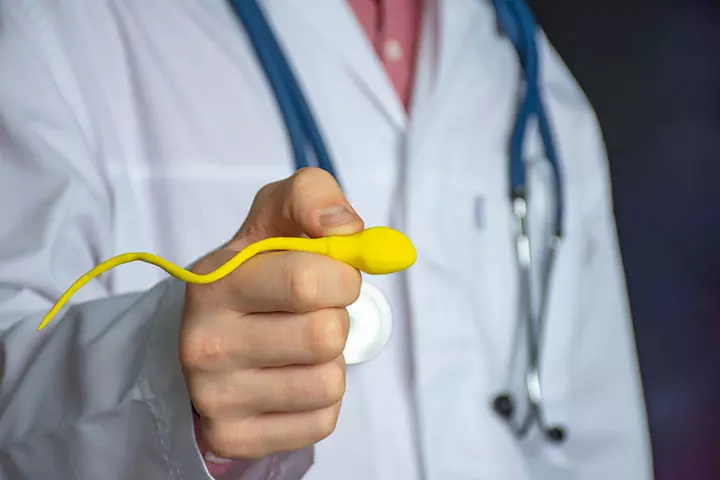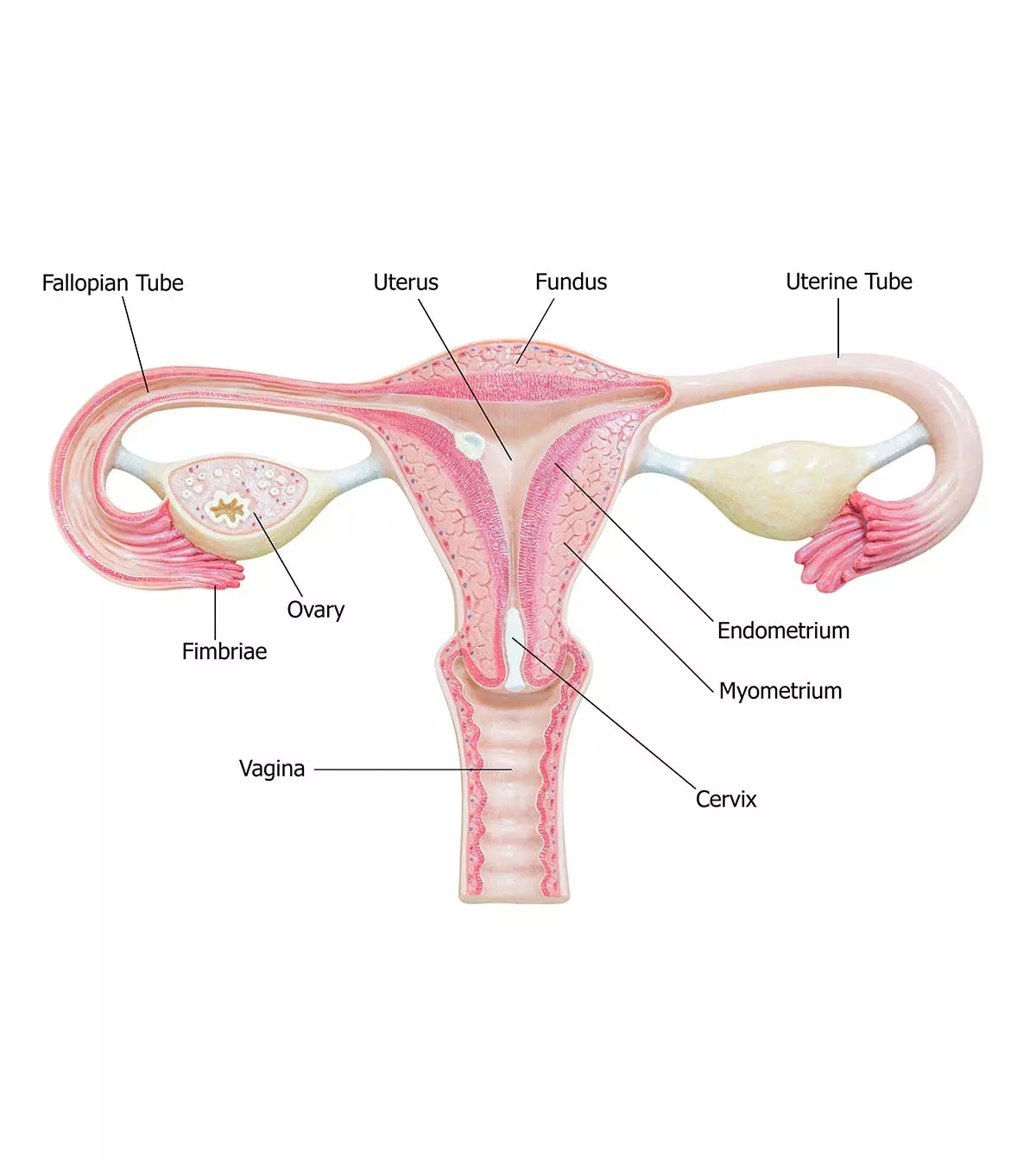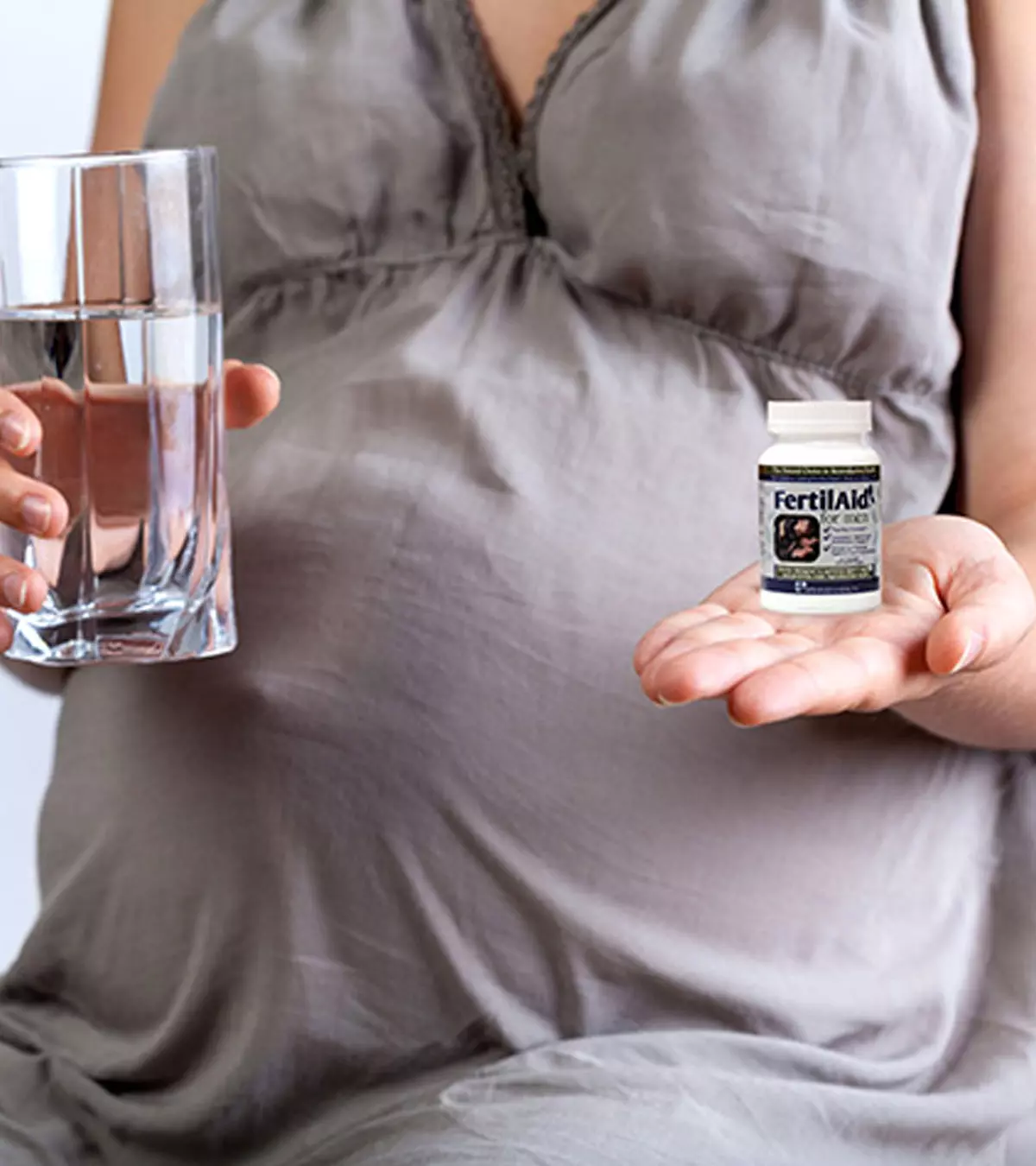
Image: Midjourney/ MomJunction Design Team
Fertility drugs for men are believed to improve testosteroneiMale sex hormone produced in the testicles that plays a vital role in reproduction and growth levels by balancing the hormones. Thus, these drugs improve sperm health and may enhance men’s fertility. However, not much research has been conducted on how these fertility treatments affect men. Moreover, there are only a few drug options available that help in enhancing sperm production. Nonetheless, some research explains how the drugs can improve the condition of men with pituitary glandiA small gland attached to the base of the brain -related hormonal disorders (1). Keep reading the post to understand what reproductive medicines are available for men, how they act in the body, and their side effects.

Key Pointers
- The critical factors of male infertility are considered by doctors from different angles.
- Male infertility can be caused by hormonal imbalances, medical conditions, and other factors.
- Fertility drugs such as Clomiphene, Gonadotropins, Imipramine, and others can help improve testosterone levels in men.
- Controlling weight gain and restricting drug or alcohol consumption can prevent male infertility.
Different Fertility Drugs For Men

Most of the conventional fertility drugs prescribed for women are also used to treat infertility in men as the same hormones control reproduction in both. Here are some of the common fertility drugs that doctors prescribe:
- Clomiphene is a non-steroid medication that is used to boost the production of pituitary hormones, the follicle-stimulating hormone (FSH)iA hormone produced by the pituitary gland that is crucial for sexual development , and the luteinizing hormone (LH)iA sex hormone produced by the pituitary gland that affects the functioning of reproductive organs . It increases gonadotropin levels by exerting an antiestrogen effect and stimulates the testicles to secrete testosterone and produce healthy sperm (2) (3).
Research studies on Clomiphene citrate are limited and have mixed results. While some studies have shown no effect, some have shown little improvement in pregnancy rates (3). A case study published in the Journal of Andrology involving 42 men suggests that around 65% experienced increased sperm production when treated with Clomiphene citrate (21).
- Gonadotrophins such as Human Chorionic gonadotropin (hCG) and Human Menopausal Gonadotropin (hMG) stimulate the testes to produce testosterone and sperm. They are sometimes used in combination with assisted reproductive technologies (ART) (4).
 Research finds
Research finds- Letrozole is used to treat sperm issues related to obesity. This is known to increase testosterone levels in the body. Letrozole is usually a one–pill-a-week treatment (5).
- Bromocriptine prevents the release of prolactiniA hormone that is responsible for lactation hormone in the body, as it causes a reduction in testosterone levels. This may be prescribed for men who have sperm impairment due to hyperprolactinemiaiA condition characterized by excess production of the hormone prolactin (6).
- Imipramine is used for treating ejaculatory disorders such as retrograde retrograde ejaculationiOccurs when sperm ejaculates into the bladder instead of coming out through the urethra . It might revert the abnormal ejaculation of sperm from the bladder into the penis (7).
- Anastrazole (Arimidex) is usually suggested when the estradioliA hormone produced by ovaries during reproductive development levels are higher, and testosterone levels are lower. It may be prescribed for improving sperm production (8).
 Quick fact
Quick fact- Synthetic testosterone pills, injections, or gels were considered earlier, as they were believed to replenish the low levels of natural testosterone in the body. However, recent studies say it may have adverse effects on fertility (9). You should consult your doctor, though.
Remember that these medications cannot be used for fertility unless prescribed by a doctor or a fertility specialist. Hormonal medications can have side effects that may change how your body works.
How Do Fertility Drugs Work In Men?
Fertility drugs are likely to work in the following ways (10):
1. Stimulate hormone production
Infertility-treating pills and injections contain synthesized hormones or hormone-like substances. They establish a balance between different hormones responsible for reproduction and increase testosterone levels in men.
2. Improve semen production

The primary factor that affects men’s fertility is the inability of the genitals to produce semen. In such cases, the medication may increase the production of healthy and motile sperm. In some cases, it might also increase the production of seminal fluid.
 Research finds
Research finds3. Normalize blood sugar levels
Sometimes, elevated blood sugars might cause infertility in men and women alike. In such cases, the drug might help keep the blood sugar levels under control and prevent diabetes as well as infertility.
4. Stimulate blood flow
Fertility drugs may not only restore the activity of reproductive organs but also stimulate blood flow.
They help in conditions where infertility is a result of poor blood circulation in the genital area.
5. Increase libido
Fertility medications also contain aphrodisiac properties. They might help boost men’s sexual drive, therefore, improving the sexual life of the couple.
Dr. Jonathan Ramsay, urologist and fertility specialist from London, shares valuable insights on his blog about medical treatments for male infertility. He explains, “In the majority of cases of oligospermia (too few sperm but enough for ICSI), we concentrate more on improving sperm quality to try to improve success rates. Improving the DNA quality of the sperm (DNA fragmentation) is the current focus for developments and new treatments. The most promising area relates to inflammation of the genital tract (the tubes through which the sperm travel) (i).
Are There Any Side Effects Of Fertility Drugs In Men?

Side effects may not be the same for every drug. The unpleasant implications of some of the commonly prescribed medications are discussed below (11).
Clomiphene side effects are usually mild and include:
- Nausea
- Headache
- Weight gain
- Vision changes
- Dizziness
- Changes in libido
- Breast enlargement
GonadotrophinsiHormones that stimulate the sex glands can cause side effects, such as:
- Soreness at the site of injection
- Acne
- Changes in libido
- Breast enlargement
Bromocriptine side effects include:
- Liver problems
- High blood pressure
- Hallucinations
- Confusion
- Abnormal body movements
Rare but severe side effects of these drugs can happen and may need immediate medical attention. Therefore, watch for any reactions and discuss your concerns with the doctor so they prescribe the right medication for you.
Can You Boost Male Fertility Naturally?
Any fertility problem should be discussed with a qualified medical practitioner, an Andrologist or a Reproductive endocrinologist for the best advice. There are no quick, natural treatments for improving your fertility, but you may follow these healthy practices.
1. Improve nutrition and diet
A balanced diet will raise your chances of conceiving. Make sure your food has the required amounts of minerals, vitamins, and iron. Nutritional deficiencies can impair hormonal functioning, prevent sperm production, and lead to abnormal and unhealthy sperms.
- Eat fresh fruits, vegetables, whole grains, legumes, fish, poultry, legumes, nuts, and seeds, as they are believed to be among those foods that increase fertility.
- Drink water and keep yourself hydrated.
- Try to maintain a weight that is ideal for your age and height.
Dr. Laura Purdy, a US-based board-certified family medicine physician, says, “There are no specific foods that directly improve sperm count. However, it is important that the man is living a healthy lifestyle. They should have a healthy, nutritious, and balanced diet and limit the intake of caffeine, alcohol, drugs, and other substances, such as cigarettes to have the healthiest body and sperm.”
2. Exercise regularly
Regular exercise may improve testosterone levels. Studies show that men who exercise regularly have better semen quality and higher testosterone levels (12).
However, you should avoid excessive exercise as that can have an opposite effect on fertility. If you are not sure about what exercises to do, talk to a trainer. They may be able to help you with the right exercise regimen.
3. Include nutritional supplements

If your doctor sees the necessity, they may prescribe nutritional supplements that might help increase sperm count and/or motility (13).
- Vitamin C helps prevent the sperm from sticking together and improves the chances of fertility.
- Vitamin E is a strong antioxidant that helps protect sperm from damage and supports male fertility.
- Zinc supplements may help increase testosterone levels, sperm motility, and count.
- The body produces arginine upon protein digestion. Arginine is needed to produce sperm cells. You may have meat, poultry, dairy, fish, nuts, and chocolate to obtain this compound.
Dr. Purdy recommends, “If the cause of male infertility is low testosterone, men may find that taking Asheville, Gonda, vitamin D, or zinc could be beneficial for naturally improving their testosterone levels. However, for people who have a severe deficiency, this will not be helpful. It is important to check in with your urologist so that the best most targeted treatments can be picked out for you, including supplements and vitamins.”
 Did you know?
Did you know?Treatment methods ensure that infertility is cured or mitigated. But there are ways of preventing infertility too.
Can Male Infertility Be Prevented?
Male infertility can result from various factors, including genetics, alcohol or drug abuse, and occupational or environmental factors (15). While it may not always be preventable, adopting a healthy lifestyle may help reduce fertility-related issues. Here are some tips that could help improve your reproductive health and increase the chances of conception (16) (17):
- Abstain from smoking, consuming drugs or alcohol, and taking unprescribed medications, as they can negatively impact sperm quality.
- Maintain a healthy body weight and BMI with a regular exercise routine to support overall reproductive function.
- Avoid wearing tight or heavy clothing, taking long hot baths, or using saunas to prevent overheating, which can affect sperm production.
 Caution
Caution
- Incorporate nutritious meals into your daily diet, including vegetables, fruits, and dry fruits like walnuts.
- Choose organic foods whenever possible to reduce exposure to harmful pesticides and herbicides.
- Avoid prolonged sitting and excessive work-related stress. Manage stress through meditation or yoga to promote hormonal balance.
- Limit exposure to heavy metals, pesticides, and other toxic agents, as they can contribute to fertility issues.
- Engage in regular sexual intercourse, preferably twice a week, to maintain reproductive health and improve sperm motility.
- Minimize the use of synthetic cosmetics and deodorants, as certain chemicals may disrupt hormonal balance and affect fertility.
- Get tested for sexually transmitted diseases (STDs) to facilitate early detection and treatment. According to the Centers for Disease Control and Prevention (CDC), 2.4 million cases of sexually transmitted diseases were reported in 2025 (18).
Frequently Asked Questions
1. What is an ideal sperm count for conception?
Research studies suggest that a motile sperm count of nearly or more than 40 million per ml falls under the fertility bracket. Semen analysis can determine the motility, morphology, and concentration of sperm in a given sample. Likewise, with a sperm count of less than 13.5 million per ml, the chances of conception drop significantly (14).
2. Can infertility in men be cured?
When the underlying issues are identified early or even when there is no specific cause, infertility in men is manageable (in most cases). In addition to medicines and supplements, there are also surgical methods for treating infertility (20).
3. Does masturbation cause low sperm count?
“Frequent ejaculation from any method could potentially result in a sperm count that is not high enough to cause a pregnancy if the man already has a low sperm count at baseline. For other men, the frequency is irrelevant, and they will be capable of having enough sperm count to conceive, even if they are having frequent ejaculations, from intercourse or from masturbation,” opines Dr. Purdy.
Infertility in men is an issue that can affect mental peace. But fret not, as there is hope for its management with some of the most commonly used infertility drugs for men and effective home remedies. Certain factors can cause infertility, and you may start by working on them and avoiding such practices. Remember to consult your doctor before resorting to any medicines, as these may sometimes induce negative impacts if taken without a prescription.
Infographic: Natural Solutions To Problems With Male Fertility
Various natural herbs are said to have a positive impact on male fertility. However, before trying them, please consult a certified herbal medicinal specialist or your healthcare provider. The same goes for different yoga poses considered good for improving fertility. The infographic below discusses some natural solutions.
Some thing wrong with infographic shortcode. please verify shortcode syntax
Illustration: Fertility Drugs For Men To Boost Sperm Count

Image: Dall·E/MomJunction Design Team
Drugs can have a negative impact on male fertility, affecting sperm production and quality. Learn more about how to cope with these effects through this informative video.
Personal Experience: Source
MomJunction articles include first-hand experiences to provide you with better insights through real-life narratives. Here are the sources of personal accounts referenced in this article.
i. Medical male fertility treatments;https://jonathanramsay.co.uk/medical-male-fertility-treatments/
References
1. Fertility Drugs; California State University, Northridge (CSUN)
2. G. L. Foss et al.; The Treatment Of Subfertile Men With Clomiphene Citrate; Journal of Reproduction & Infertility (1973)
3. Willets AE et al.; Clomiphene for the treatment of male infertility; Reprod Sci. (2013)
4. J Rajkanna et al.; Successful fertility treatment with gonadotrophin therapy for male hypogonadotrophic hypogonadism; Endocrinol Diabetes Metab Case Rep. (2016)
5. Letrozole is a promising new treatment of male infertility; The Endocrine Society; Science Daily (2015)
6. Laufer N et al.; Effect of bromocriptine treatment on male infertility associated with hyperprolactinemia; Arch Androl. (1981)
7. Ochsenkühn R et al.; Imipramine for successful treatment of retrograde ejaculation caused by retroperitoneal surgery; Int J Androl. (1999)
8. Tejash Shah et al.;Efficacy of anastrozole in the treatment of hypogonadal, subfertile men with body mass index ≥25 kg/m2; Translational Andrology and Urology (2025)
9. Amir Shahreza Patel et al.; Testosterone Is a Contraceptive and Should Not Be Used in Men Who Desire Fertility; World J Mens Health (2019)
10. Ali A. Dabaja and Peter N. Schlegel; Medical treatment of male infertility; Transl Androl Urol. (2014)
11. Male Fertility Drugs; University of Utah
12. Vaamonde D et al.; Physically active men show better semen parameters and hormone values than sedentary men; Eur J Appl Physiol. (2012)
13. David F Yao and Jesse N Mills; Male infertility: lifestyle factors and holistic, complementary, and alternative therapies; Asian J Androl. 2016
14. Sperm Analysis Values: Which Indicate Infertility?; American Academy of Family Physicians.
15. Jiayi Ding et al.; FDA-approved medications that impair human spermatogenesis; Oncotarget; (2016)
16. How to improve male fertility; Tommy’s.org
17. Male Infertility; Cleveland Clinic
18. Sexually Transmitted Infections Surveillance, 2025; Centers for Disease Control and Prevention
19. SAR Mortazavi et al., The Fundamental Reasons Why Laptop Computers should not be Used on Your Lap; (2016)
20. What is Male Infertility?; American Urological Association.
21. Alayman Hussein et al., Clomiphene Administration for Cases of Nonobstructive Azoospermia: A Multicenter Study; (2013); Journal of Andrology
Community Experiences
Join the conversation and become a part of our nurturing community! Share your stories, experiences, and insights to connect with fellow parents.
Read full bio of Dr. Rita Bakshi
- Dr. Laura Purdy is a board-certified Family Medicine Physician with over a decade of experience. Previously a performing pianist, she later did her graduation in Psychology (Magna Cum Laude) from Ball State University and attended medical school at the Uniformed Services University of the Health Sciences. After graduating with a family medicine residency at Georgia’s Martin Army Hospital, she joined as a US Army physician.
 Dr. Laura Purdy is a board-certified Family Medicine Physician with over a decade of experience. Previously a performing pianist, she later did her graduation in Psychology (Magna Cum Laude) from Ball State University and attended medical school at the Uniformed Services University of the Health Sciences. After graduating with a family medicine residency at Georgia’s Martin Army Hospital, she joined as a US Army physician.
Dr. Laura Purdy is a board-certified Family Medicine Physician with over a decade of experience. Previously a performing pianist, she later did her graduation in Psychology (Magna Cum Laude) from Ball State University and attended medical school at the Uniformed Services University of the Health Sciences. After graduating with a family medicine residency at Georgia’s Martin Army Hospital, she joined as a US Army physician.
Read full bio of Rebecca Malachi
Read full bio of Swati Patwal
Read full bio of Dr. Joyani Das














